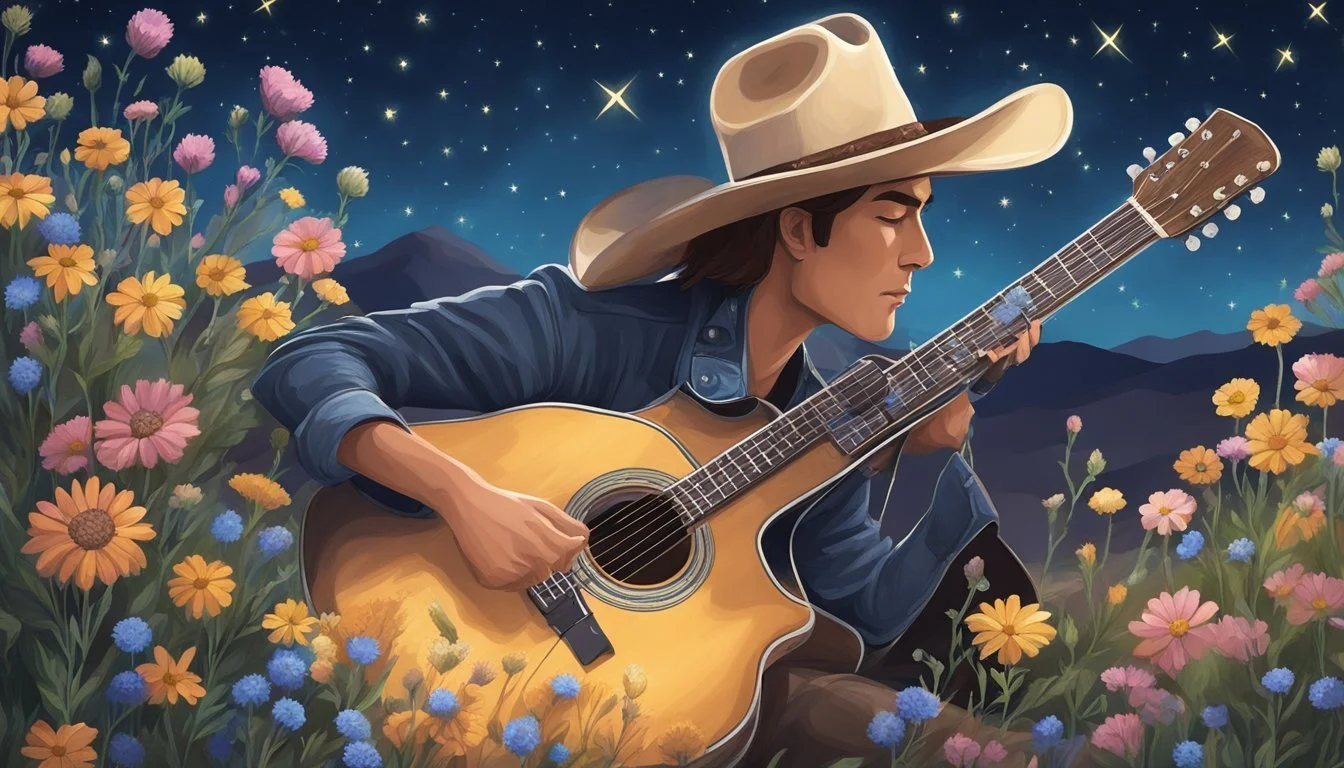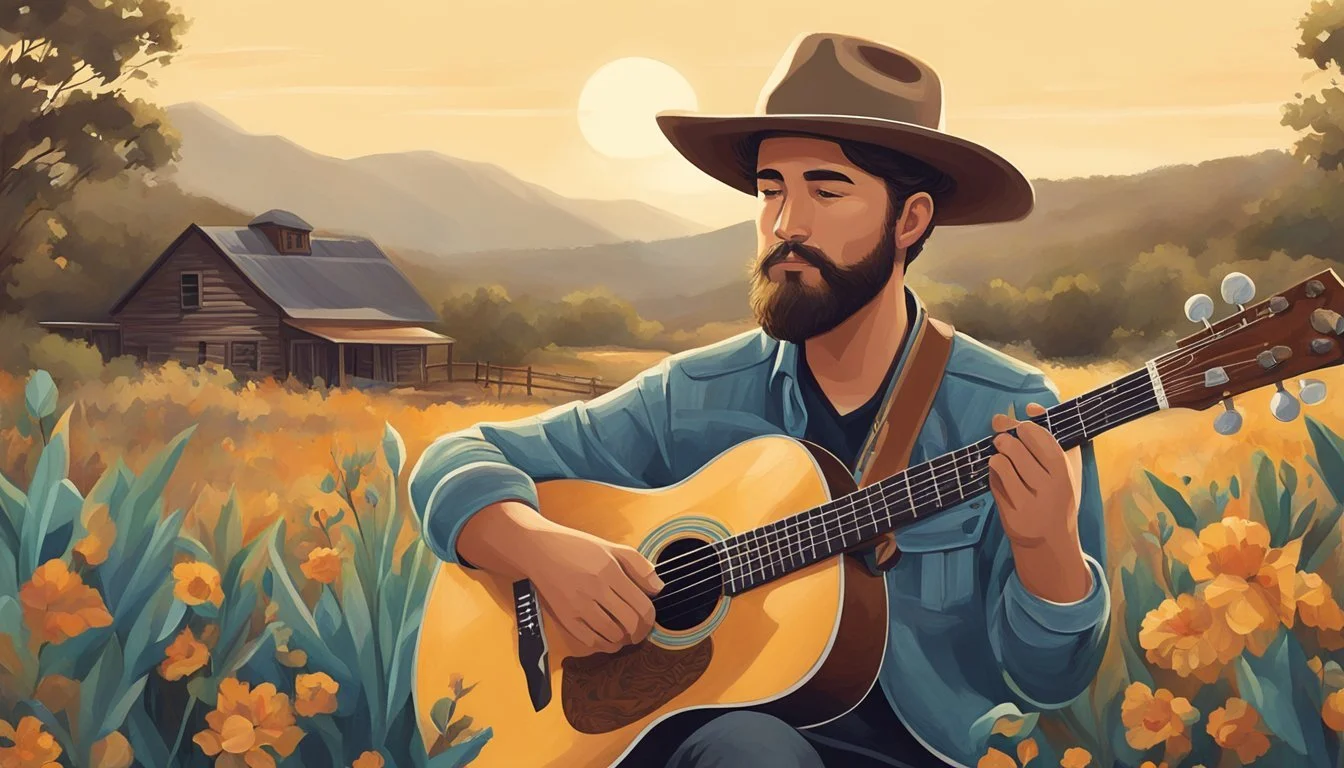Lyric Themes in "Willie Nelson & Family"
Exploring the Storytelling Legacy of Country Music's Icon
Willie Nelson, a legendary figure in country music, has captivated audiences for over seven decades with his distinctive voice and poignant songwriting. His music, often performed with his band Willie Nelson & Family, explores a range of themes that resonate deeply with listeners.
Nelson's lyrics frequently touch on universal experiences like love, loss, and the passage of time, offering comfort and insight to fans across generations. Songs like "Something You Get Through" delve into grief and resilience, providing a hopeful perspective on life's challenges. This ability to address complex emotions with sensitivity and wisdom has solidified Nelson's place as one of America's most beloved musicians.
The themes in Willie Nelson & Family's music often reflect the band's experiences on the road, a lifestyle that has inspired some of their most iconic tracks. "On the Road Again," released in 1980, serves as an anthem for touring musicians and travelers alike, celebrating the freedom and excitement of life on the move. Through these lyrical explorations, Nelson and his family band continue to create music that resonates with the human experience.
Early Career and Breakthrough
Willie Nelson's journey to stardom began with humble roots and perseverance. His unique sound and songwriting talents gradually gained recognition, leading to significant milestones in his career.
The Beginnings and RCA Victor Era
Willie Nelson's musical path started in Texas, where he worked as a DJ and performed in local clubs. In 1960, he moved to Nashville and signed with RCA Victor. During this period, Nelson wrote hit songs for other artists, including "Crazy" for Patsy Cline.
His own recordings for RCA, however, didn't achieve the same success. The label pushed for a polished Nashville sound, which clashed with Nelson's raw, authentic style. Despite releasing several albums, Nelson struggled to find his footing as a performer during this time.
Rise to Fame with 'Shotgun Willie' and 'Red Headed Stranger'
In 1972, Nelson left RCA Victor and signed with Atlantic Records. This move marked a turning point in his career. The 1973 album "Shotgun Willie" showcased Nelson's distinctive style and outlaw country sound.
"Red Headed Stranger," released in 1975, became Nelson's breakthrough as a performer. The concept album's stripped-down production and storytelling resonated with listeners. It spawned the hit single "Blue Eyes Crying in the Rain," earning Nelson his first Grammy Award.
These albums established Willie Nelson as a major force in country music. His unique voice, unconventional approach, and authentic songwriting set him apart from mainstream Nashville artists.
Defining Albums and Hit Songs
Willie Nelson's extensive discography features several landmark albums and iconic songs that have shaped his legacy in country music. His work spans decades and encompasses a wide range of musical styles and lyrical themes.
Critical Acclaim of 'Stardust' and 'Always on My Mind'
'Stardust', released in 1978, marked a pivotal moment in Willie Nelson's career. This album of pop standards showcased Nelson's versatility as an interpreter of classic songs. It spent two years on the Billboard charts and earned widespread critical praise.
'Always on My Mind', the title track from his 1982 LP, became one of Nelson's signature songs. The album topped the country charts and crossed over to mainstream success. It won three Grammy Awards, cementing Nelson's status as a crossover artist.
Both albums demonstrated Nelson's ability to breathe new life into familiar tunes, expanding his audience beyond traditional country fans.
Iconic Tunes - 'Crazy' and 'On the Road Again'
'Crazy', penned by Nelson in 1961, became a massive hit for Patsy Cline. The song's emotional depth and memorable melody have made it a country music standard. It showcases Nelson's exceptional songwriting skills early in his career.
'On the Road Again', released in 1980, captures the essence of Nelson's touring lifestyle. This upbeat, instantly recognizable tune won a Grammy Award and has become synonymous with Nelson's persona as a traveling troubadour.
These songs represent different facets of Nelson's artistry - his ability to craft poignant ballads and energetic anthems that resonate with diverse audiences.
Exploring Themes within 'Pretty Paper' and 'Blue Eyes Crying in the Rain'
'Pretty Paper', written by Nelson and recorded by Roy Orbison in 1963, tells a poignant story of a street vendor during the holiday season. The song's empathetic portrayal of often-overlooked individuals reflects Nelson's compassionate songwriting.
'Blue Eyes Crying in the Rain', from Nelson's 1975 album 'Red Headed Stranger', became his first number-one hit as a singer. The song's stripped-down arrangement and emotional delivery exemplify Nelson's ability to convey deep sentiment through simple, powerful lyrics.
Both songs demonstrate Nelson's talent for creating vivid narratives and evoking strong emotions through his music. They highlight themes of human connection and life's struggles that run throughout his catalog.
Collaborations and Duets
Willie Nelson's musical journey is enriched by his numerous collaborations and duets with fellow country legends. These partnerships have produced timeless songs that showcase Nelson's versatility and ability to harmonize with diverse voices.
Musical Partnerships with Waylon Jennings and Merle Haggard
Willie Nelson's collaborations with Waylon Jennings and Merle Haggard stand out as some of the most influential in country music history. Nelson and Jennings formed the supergroup The Highwaymen with Johnny Cash and Kris Kristofferson, creating iconic albums and hit singles.
Their duet "Mammas Don't Let Your Babies Grow Up to Be Cowboys" became a country classic. Nelson and Haggard's partnership resulted in the album "Pancho & Lefty," with the title track reaching number one on the country charts.
These collaborations blended outlaw country styles and showcased each artist's unique vocal talents.
The Impact of Duets with Emmylou Harris and Dolly Parton
Willie Nelson's duets with Emmylou Harris and Dolly Parton have left an indelible mark on country music. Nelson and Harris collaborated on several albums, including "All the Good Times" which won a Grammy for Best Traditional Folk Album.
Their rendition of "Crazy" is particularly memorable. Nelson's work with Dolly Parton includes the heartfelt duet "Everything's Beautiful (In Its Own Way)."
These partnerships highlighted Nelson's ability to complement female vocalists, creating harmonies that resonated with audiences. The duets often explored themes of love, loss, and the human experience, adding depth to Nelson's lyrical repertoire.
Lyrical Exploration and Songwriting
Willie Nelson's songwriting prowess spans decades, blending storytelling and emotional depth across genres. His lyrics capture the essence of human experiences, from nostalgic journeys to family bonds.
Narrative Storytelling in 'City of New Orleans' and 'Family Bible'
'City of New Orleans' paints a vivid picture of a train journey, weaving together snapshots of American life. Nelson's interpretation brings the lyrics to life, describing passengers, landscapes, and the bittersweet passage of time.
'Family Bible' showcases Nelson's ability to craft deeply personal narratives. The song reflects on childhood memories and religious upbringing, using simple yet powerful imagery.
Both songs demonstrate Nelson's talent for creating lyrical landscapes that resonate with listeners. His words transport audiences to specific moments and places, evoking shared experiences and emotions.
Emotional Depth in Lyrics Across Different Genres
Nelson's versatility shines in his ability to convey complex emotions through various musical styles. In country ballads, he explores themes of heartbreak and longing with raw honesty.
His forays into blues allow for gritty, soulful expressions of hardship and resilience. Nelson's lyrics in this genre often touch on life's struggles and the human spirit's endurance.
Across genres, Nelson's words consistently strike emotional chords. He balances vulnerability with strength, crafting lyrics that feel both deeply personal and universally relatable.
Cultural Influence and Legacy
Willie Nelson's impact on music and culture extends far beyond country boundaries. His distinctive style and songwriting have shaped the industry for decades, influencing artists across genres.
Willie Nelson's Impact on Country Music and Beyond
Willie Nelson revolutionized country music with his unique vocal style and innovative songwriting. His classic songs like "On the Road Again" and "Always on My Mind" became cultural touchstones. Nelson's willingness to blend country with other genres, including jazz and rock, expanded country music's appeal.
Nelson's influence reached Nashville and beyond, inspiring countless musicians. His unconventional approach challenged industry norms and paved the way for more artistic freedom. Many contemporary artists cite Nelson as a key influence on their music and careers.
Enduring Legacy and the Role of 'The Outlaw Movement'
Willie Nelson played a pivotal role in the Outlaw Movement of the 1970s. This movement rejected the polished Nashville sound in favor of a rawer, more authentic style. Nelson, along with artists like Waylon Jennings, helped redefine country music during this era.
The Outlaw Movement's impact continues today, with many artists embracing its independent spirit. Nelson's commitment to causes like farm aid and marijuana legalization further cemented his cultural significance. His longevity in the music industry and continued relevance speak to his enduring legacy.
Notable Performances and Live Shows
Willie Nelson's live performances have played a crucial role in shaping his legendary status. His concerts have become iconic events, while his live albums capture the raw energy and authenticity of his music.
Iconic Concerts - From 'The Longhorn Jamboree' to 'Farm Aid'
Willie Nelson's concert career began in the 1950s with 'The Longhorn Jamboree' in Texas. These early shows laid the foundation for his reputation as a captivating live performer. In the 1970s, Nelson's Fourth of July Picnic concerts became annual traditions, drawing massive crowds.
The launch of Farm Aid in 1985 marked a significant milestone. This benefit concert, co-founded by Nelson, raised awareness for family farmers. It has since become an annual event, featuring top artists across genres.
Nelson's tour bus, nicknamed "Honeysuckle Rose," became a symbol of his relentless touring schedule. The bus has transported him to countless venues across the country, from small honky-tonks to major arenas.
The Significance of Live Albums in Willie Nelson's Career
Live albums have been instrumental in capturing Willie Nelson's onstage magic. His 1978 release "Willie and Family Live" showcased his unique blend of country, rock, and folk styles.
"Honeysuckle Rose," the soundtrack to Nelson's 1980 film, features live recordings that highlight his band's tight musicianship. The album's success further cemented Nelson's reputation as a dynamic live performer.
Nelson's live recordings often include spontaneous collaborations with other artists. These unplanned duets have resulted in some of his most memorable performances, demonstrating his versatility and improvisational skills.
Live albums continue to be an important part of Nelson's discography, offering fans a way to experience his concerts long after the final notes have faded.
Influence of Time and Age on Music
Willie Nelson's music has evolved over the decades, reflecting his experiences and changing perspectives. His later works show a deepening of themes and a contemplative approach to life and artistry.
Later Works: 'Band of Brothers' and 'My Way'
In 2012, Nelson released 'Heroes', signaling a new creative period. 'Band of Brothers' followed in 2014, featuring Nelson's first significant batch of original songs in years. The album explored themes of friendship, loyalty, and the passage of time. Songs like "The Wall" and "Bring It On" showcased Nelson's introspective songwriting and weathered vocals.
'My Way', released in 2018, paid tribute to Frank Sinatra. Nelson's interpretations of classic songs highlighted his ability to infuse familiar tunes with personal meaning. Tracks like "It Was a Very Good Year" took on new poignancy coming from an artist in his 80s.
Evolution of Themes in Recent Albums
Nelson's recent albums reveal a shift towards more reflective and existential themes. He increasingly addresses mortality, legacy, and the wisdom gained through years of experience. Songs often blend humor with profound insights on aging and the human condition.
His lyrics have become more direct and unvarnished, eschewing metaphor for straightforward observations. This evolution reflects Nelson's comfort with his place in music history and his desire to communicate authentically with listeners. Recent collaborations with younger artists also demonstrate his ongoing relevance and ability to bridge generational gaps in country music.






